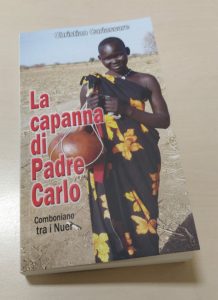Fr. Carlo’s Hut, Fr Christian Carlassare, mccj
 I take this opportunity to announce the publication of a book that I authored. Unfortunately, at the moment the book is available only in the Italian language as it is an Italian publication.
I take this opportunity to announce the publication of a book that I authored. Unfortunately, at the moment the book is available only in the Italian language as it is an Italian publication.
I wrote to remember and celebrate my years spent in Fangak. I gave myself neither to a historical study nor to a theological reflection of the mission. I wrote a novel to be able to present the Nuer people, tell the story of the mission and evangelization among them within the historical context of the country and many interesting stories that present the beauty of the people.
I titled it: Father Carlo’s hut. In fact, Fr. Carlo is the protagonist: model of today’s missionary. The title refers to a much more famous novel: Uncle Tom’s Cabin. This book first introduced me to the topic of black liberation when I was still a child.
Therefore, mission is the true protagonist of the novel: a mission that wants to save the human goodness in every person and situation. The characters in the novel are inspired by real people: I tried to present their traits and the teaching I learned from each of them. Each character appears immersed in his or her own contradictions which still do not destroy the goodness of each. If no one can be exalted, no one can be condemned. The Lord knows how to write straight in the crooked lines of everyone.
The mission is presented as a journey. Along this journey, the missionary comes slowly to meet the people. And along the way, the population has the opportunity to make themselves known and present the richness of their culture and tradition. As the journey continues, there is a progressive unfolding of the stages of life starting from birth and childhood, to adolescence and youth, to adult life with marriage, family and death. And in all this we can perceive that even though in certain aspects culture may deviate from a certain model of Christianity, in truth people live some core values of Christianity in sincerity and simplicity.
The 1983-2005 conflict remains in the background to the whole story, pointing out how much violence has marked the life of this new born nation. By exposing this fact, the novel wants to encourage readers to commit themselves to building a more humane and fraternal society by overcoming all those obstacles that divide people: ignorance, fear, prejudice.
Holiness is also a central theme of the novel. There is a clear reference to the fact that only fully lived charity makes a real encounter with Jesus possible and allows the Gospel to be rewritten in everyday history in a vivid and understandable way.
Fr, Christian Crlassare, mccj

